【单元考点培优】Unit 2 School life 专题07 句型转换-2025-2026学年七年级英语上册单元复习考点培优沪教版(2024)(含答案解析)
文档属性
| 名称 | 【单元考点培优】Unit 2 School life 专题07 句型转换-2025-2026学年七年级英语上册单元复习考点培优沪教版(2024)(含答案解析) | 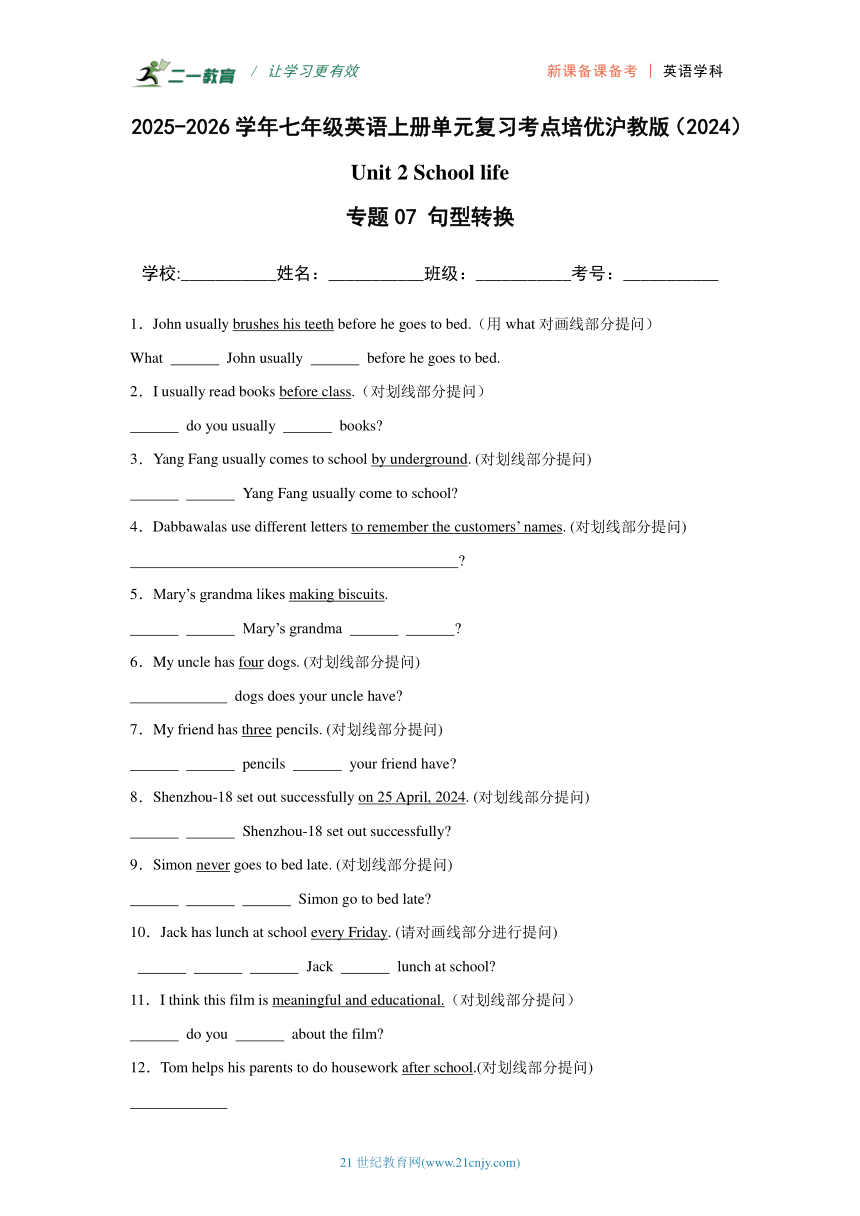 | |
| 格式 | docx | ||
| 文件大小 | 52.5KB | ||
| 资源类型 | 试卷 | ||
| 版本资源 | 沪教版 | ||
| 科目 | 英语 | ||
| 更新时间 | 2025-07-23 13:30:22 | ||
图片预览

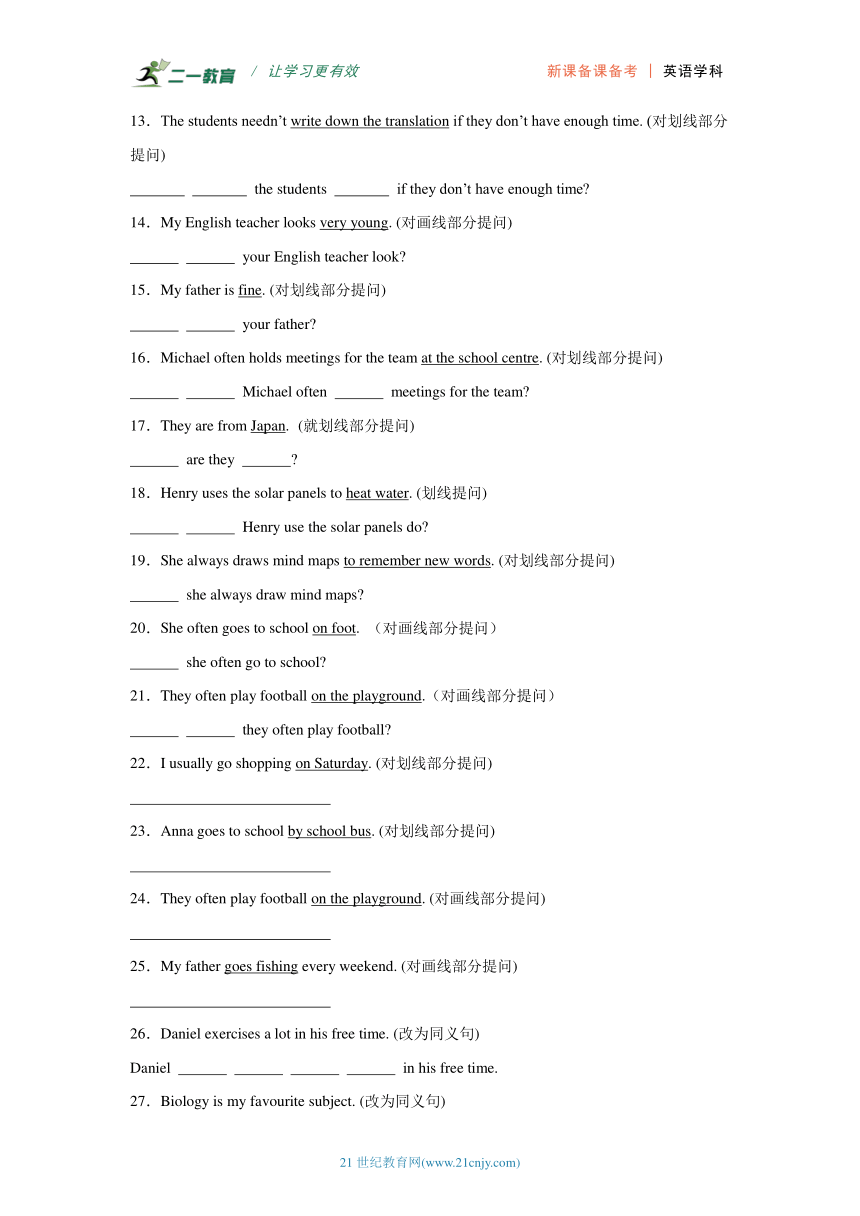
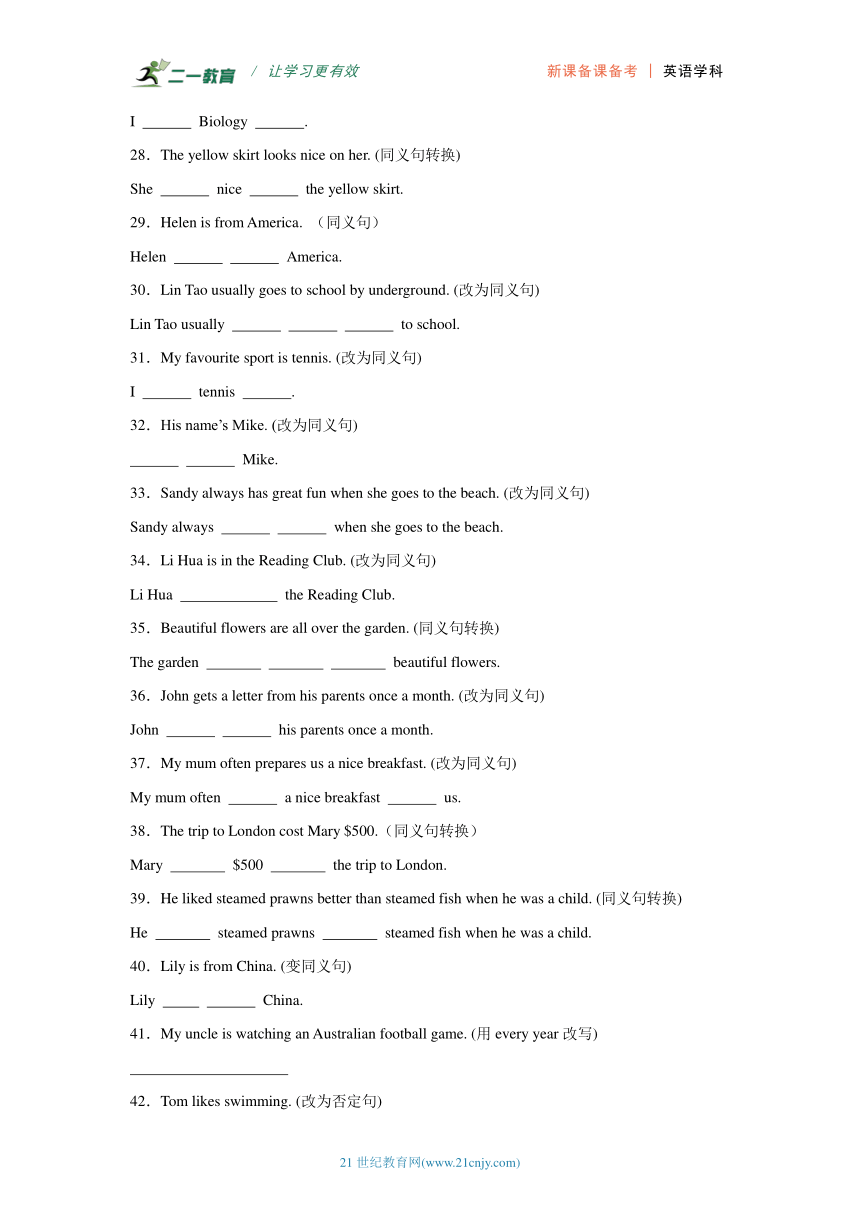
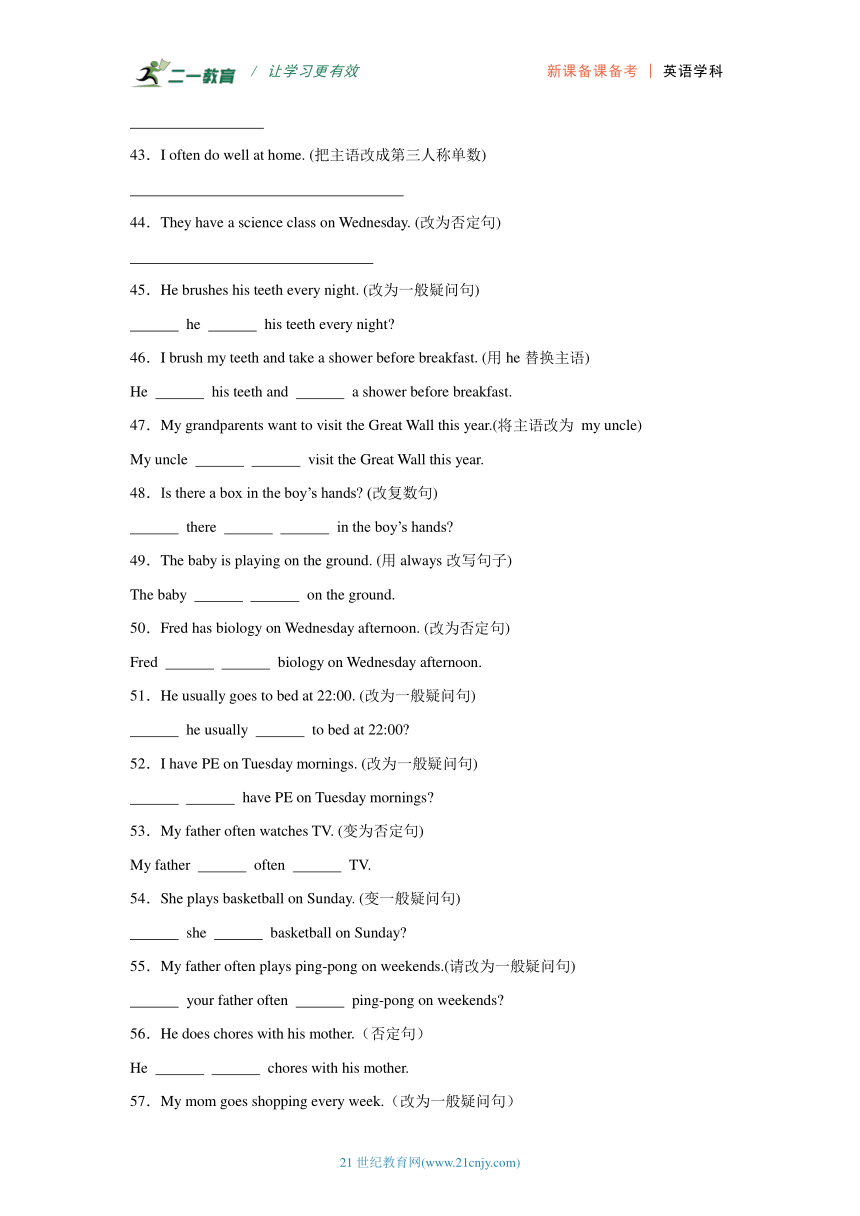
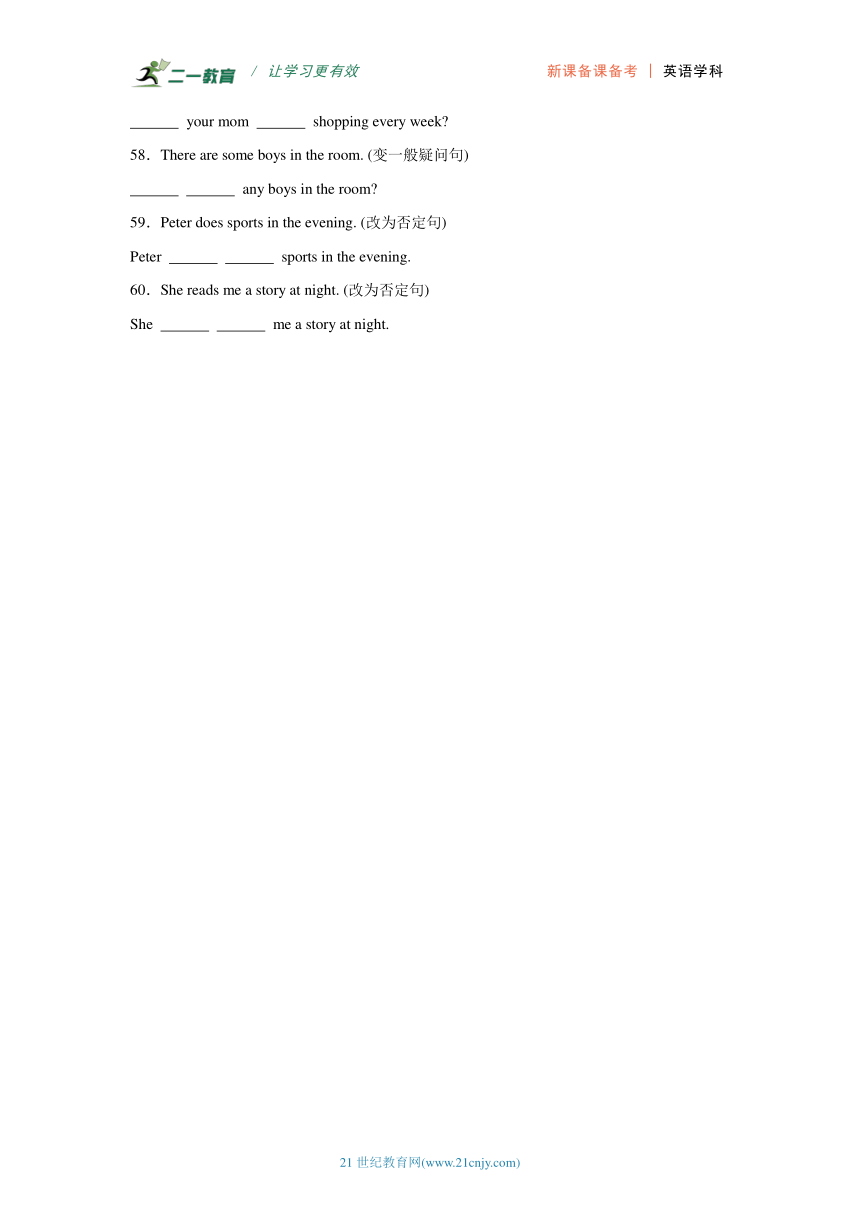
文档简介
/ 让学习更有效 新课备课备考 | 英语学科
/ 让学习更有效 新课备课备考 | 英语学科
2025-2026学年七年级英语上册单元复习考点培优沪教版(2024)Unit 2 School life
专题07 句型转换
学校:___________姓名:___________班级:___________考号:___________
1.John usually brushes his teeth before he goes to bed.(用what对画线部分提问)
What John usually before he goes to bed.
2.I usually read books before class.(对划线部分提问)
do you usually books
3.Yang Fang usually comes to school by underground. (对划线部分提问)
Yang Fang usually come to school
4.Dabbawalas use different letters to remember the customers’ names. (对划线部分提问)
5.Mary’s grandma likes making biscuits.
Mary’s grandma
6.My uncle has four dogs. (对划线部分提问)
dogs does your uncle have
7.My friend has three pencils. (对划线部分提问)
pencils your friend have
8.Shenzhou-18 set out successfully on 25 April, 2024. (对划线部分提问)
Shenzhou-18 set out successfully
9.Simon never goes to bed late. (对划线部分提问)
Simon go to bed late
10.Jack has lunch at school every Friday. (请对画线部分进行提问)
Jack lunch at school
11.I think this film is meaningful and educational.(对划线部分提问)
do you about the film
12.Tom helps his parents to do housework after school.(对划线部分提问)
13.The students needn’t write down the translation if they don’t have enough time. (对划线部分提问)
the students if they don’t have enough time
14.My English teacher looks very young. (对画线部分提问)
your English teacher look
15.My father is fine. (对划线部分提问)
your father
16.Michael often holds meetings for the team at the school centre. (对划线部分提问)
Michael often meetings for the team
17.They are from Japan. (就划线部分提问)
are they
18.Henry uses the solar panels to heat water. (划线提问)
Henry use the solar panels do
19.She always draws mind maps to remember new words. (对划线部分提问)
she always draw mind maps
20.She often goes to school on foot. (对画线部分提问)
she often go to school
21.They often play football on the playground.(对画线部分提问)
they often play football
22.I usually go shopping on Saturday. (对划线部分提问)
23.Anna goes to school by school bus. (对划线部分提问)
24.They often play football on the playground. (对画线部分提问)
25.My father goes fishing every weekend. (对画线部分提问)
26.Daniel exercises a lot in his free time. (改为同义句)
Daniel in his free time.
27.Biology is my favourite subject. (改为同义句)
I Biology .
28.The yellow skirt looks nice on her. (同义句转换)
She nice the yellow skirt.
29.Helen is from America. (同义句)
Helen America.
30.Lin Tao usually goes to school by underground. (改为同义句)
Lin Tao usually to school.
31.My favourite sport is tennis. (改为同义句)
I tennis .
32.His name’s Mike. (改为同义句)
Mike.
33.Sandy always has great fun when she goes to the beach. (改为同义句)
Sandy always when she goes to the beach.
34.Li Hua is in the Reading Club. (改为同义句)
Li Hua the Reading Club.
35.Beautiful flowers are all over the garden. (同义句转换)
The garden beautiful flowers.
36.John gets a letter from his parents once a month. (改为同义句)
John his parents once a month.
37.My mum often prepares us a nice breakfast. (改为同义句)
My mum often a nice breakfast us.
38.The trip to London cost Mary $500.(同义句转换)
Mary $500 the trip to London.
39.He liked steamed prawns better than steamed fish when he was a child. (同义句转换)
He steamed prawns steamed fish when he was a child.
40.Lily is from China. (变同义句)
Lily China.
41.My uncle is watching an Australian football game. (用every year改写)
42.Tom likes swimming. (改为否定句)
43.I often do well at home. (把主语改成第三人称单数)
44.They have a science class on Wednesday. (改为否定句)
45.He brushes his teeth every night. (改为一般疑问句)
he his teeth every night
46.I brush my teeth and take a shower before breakfast. (用he替换主语)
He his teeth and a shower before breakfast.
47.My grandparents want to visit the Great Wall this year.(将主语改为 my uncle)
My uncle visit the Great Wall this year.
48.Is there a box in the boy’s hands (改复数句)
there in the boy’s hands
49.The baby is playing on the ground. (用always改写句子)
The baby on the ground.
50.Fred has biology on Wednesday afternoon. (改为否定句)
Fred biology on Wednesday afternoon.
51.He usually goes to bed at 22:00. (改为一般疑问句)
he usually to bed at 22:00
52.I have PE on Tuesday mornings. (改为一般疑问句)
have PE on Tuesday mornings
53.My father often watches TV. (变为否定句)
My father often TV.
54.She plays basketball on Sunday. (变一般疑问句)
she basketball on Sunday
55.My father often plays ping-pong on weekends.(请改为一般疑问句)
your father often ping-pong on weekends
56.He does chores with his mother.(否定句)
He chores with his mother.
57.My mom goes shopping every week.(改为一般疑问句)
your mom shopping every week
58.There are some boys in the room. (变一般疑问句)
any boys in the room
59.Peter does sports in the evening. (改为否定句)
Peter sports in the evening.
60.She reads me a story at night. (改为否定句)
She me a story at night.
/ 让学习更有效 新课备课备考 | 英语学科
/ 让学习更有效 新课备课备考 | 英语学科
21世纪教育网(www.21cnjy.com)
21世纪教育网(www.21cnjy.com)
参考答案及试题解析
1.does do
【解析】句意:约翰通常在睡觉前刷牙。划线部分是谓语部分,表示具体的动作,对此提问,用what“什么”,主语是John,时态是一般现在时,助动词用does,后跟动词原形do。故填does;do。
2.When read
【解析】句意:我通常在课前读书。划线部分是时间,应用when提问。句子是一般现在时,主语是I,并含有实义动词read,变为特殊疑问句时第一人称I应改为第二人称you,而且需要借助助动词do,位于主语之前,其余不变。故填When;read。
3.How does
【解析】句意:杨芳通常乘坐地铁来学校。划线部分表示交通方式,对此提问用how,首字母大写;原句中含有实义动词come,且主语为第三人称单数,时态为一般现在时,所以特殊疑问句需借助助动词does,故填How;does。
4.Why do Dabbawalas use different letters
【解析】句意:达巴瓦拉用不同的字母来记住顾客的名字。划线部分是动词不定式做目的状语,对目的提问应用why“为什么”,结合主语Dabbawalas,复数形式,时态为一般现在时,助动词用do。故填Why do Dabbawalas use different letters。
5.What does like doing
【解析】句意:玛丽的奶奶喜欢做饼干。划线部分是喜欢做的事情,故此处询问“玛丽的奶奶喜欢做什么”,疑问词是what,根据“likes”可知变疑问句时借助助动词does,后加动词原形like;like doing sth.“喜欢做某事”。故填What;does;like;doing。
6.How many
【解析】句意:我叔叔有四条狗。根据“…dogs does your uncle have ”可知,划线部分为“four”,对数量提问应该用how many+可数名词复数。故填How many。
7.How many does
【解析】句意:我的朋友有三支铅笔。划线部分three表示数量,且pencils为复数名词,用how many提问,句子应用一般现在时,主语为your friend,助动词应用does。故填How;many;does。
8.When did
【解析】句意:2024年4月25日,神舟十八号成功启程。根据题意可知,划线部分是时间,疑问词用when提问,且根据过去式set可知,变疑问句时应借助助动词did,而且did要提到主语之前,用以构成疑问语序,动词还原为动词原形。故填When;did。
9.How often does
【解析】句意:Simon从不晚睡。根据句意可知,never表示“从来不”,属于频率副词,英语中,对频率副词提问用“how often”,本句时态为一般现在时态,主语“Simon”是第三人称单数,因此用助动词“does”,并且句首单词首字母大写,故填How;often;does。
10.How often does have
【解析】句意:Jack每周五在学校吃午饭。画线部分“every Friday”意为“每周五”,表示频率,应用How often提问,原句谓语动词为实义动词has,疑问句要借助助动词does,其后跟实义动词原形have。故填How;often;does;have。
11.What think
【解析】句意:我认为这部电影很有意义,也很有教育意义。根据划线部分“meaningful and educational”可知,此处是提问对某物的看法,应用句型What do you think about...“你认为某物怎么样”,故填What;think。
12.When does Tom help his parents to do housework
【解析】句意:汤姆放学后帮父母做家务。划线部分表示时间,要用特殊疑问词when提问;句子谓语是helps,疑问句要借助于does,故填When does Tom help his parents to do housework
13.What needn’t do
【解析】句意:如果学生没有足够的时间,他们不需要写下翻译。根据题干要求,划线部分“write down the translation”表示一个动作,需特殊疑问词What“什么”,助动词needn’t放疑问词后,谓语动词用do“做”,故填What;needn’t;do。
14.How does
【解析】句意:我的英语老师看起来很年轻。根据“…your English teacher look ”及汉语提示可知,句子时态为一般现在时;划线部分为“年轻的”,应用how“怎样的”引导的特殊疑问句,位于句首,首字母应大写;“your English teacher”为第三人称单数,助动词应为does。故填How;does。
15.How is
【解析】句意:我的爸爸很好。结合划线部分是“fine”,表示怎么样,对其提问要用“how怎么样”,位于句首,首字母要大写,且把系动词“is”提到主语之前。故填How;is。
16.Where does hold
【解析】句意:迈克尔经常在学校中心为球队举行会议。划线部分at the school centre表示地点,应用where来提问,根据“holds”可知句子应用一般现在时,主语为Michale,助动词用does,后接动词原形hold。故填Where;does;hold。
17.Where from
【解析】句意:他们来自日本。根据“Japan”及题目要求可知,对Japan提问用特殊提问词where“哪里”;首字母要大写;其后引导的问句“他们来自哪里”的结构应该是“特殊疑问词where+be动词+主语+from?”。故填Where;from。
18.What does
【解析】句意:亨利用太阳能板来加热水。划线部分表示做的事情,故此处询问“亨利使用太阳能板做什么”,所以提问应该是用what“什么”;时态是一般现在时,主语是第三人称单数,所以要借助助动词does构成疑问句。故填What;does。
19.Why does
【解析】句意:她总是画思维导图来记住新单词。划线部分是目的状语,故疑问词用why,根据“draws”可知变疑问句时借助助动词does,放主语之前。故填Why does。
20.How does
【解析】句意:她经常步行去上学。划线部分是交通方式,疑问词用how;根据“goes”可知变疑问句时借助助动词does,放主语之前。故填How does。
21.Where do
【解析】句意:他们经常在操场上踢足球。根据划线部分“on the playground”可知是对地点进行提问,特殊疑问词用“Where”;通过“often”判断是一般现在时态,“they”是非第三人称单数,助动词用“do”。故填Where;do。
22.When do you usually go shopping
【解析】句意:我通常在星期六去购物。划线部分表示时间,对时间提问用疑问词when,位于句首,首字母大写;变疑问句,主语I要变you,句子是一般现在时,助动词用do,后面用动词原形go,其他部分不变。故填When do you usually go shopping
23.How does Anna go to school
【解析】句意:安娜坐校车去学校。by school bus表示交通方式,提问时特殊疑问词用how;时态是一般现在时,主语是Anna,改为疑问句时在主语前添加助动词does,动词用原形go。故填How does Anna go to school
24.Where do they often play football
【解析】句意:他们经常在操场上踢足球。on the playground表示地点,提问时用特殊疑问词where;句子是一般现在时,主语是they,疑问句中在主语前添加助动词do,动词用原形。故填Where do they often play football
25.What does your father do every weekend
【解析】句意:我父亲每个周末都去钓鱼。根据划线部分goes fishing可知,是对谓语提问,用疑问词what“什么”,原句是一般现在时,主语是三人称单数my father,疑问词后跟助动词does,划线部分用do代替。故填What does your father do every weekend
26.does lots of exercise
【解析】句意:丹尼尔在空闲时间进行大量的锻炼。根据“in his free time”可知,此句时态为一般现在时,空处位于第三人称主语Daniel后,动词用三单形式。exercise a lot可以替换成do lots of exercise。do的三单形式为does。故填does;lots;of;exercise。
27.like best
【解析】句意:生物是我最喜欢的科目。favourite意为“最喜欢的”,可以替换为“like sth. best”,该句时态为一般现在时,主语I是第一人称,谓语动词like用原形。故填like;best。
28.looks in
【解析】句意:那条黄色的裙子穿在她身上很好看。改成同义句,可表达为“她穿黄裙子很好看”,第一空指“看起来”,用look表示,主语是she,谓语动词用三单形式;in+颜色+衣服表示“穿某种颜色的衣服”,故填looks;in。
29.comes from
【解析】句意:Helen来自美国。be from=come from“来自”,时态为一般现在时,主语是第三人称单数,谓语动词用三单。故填comes;from。
30.takes the underground
【解析】句意:林涛通常坐地铁上学。take the underground=by underground“坐地铁”,是固定词组,时态为一般现在时,主语为“Lin Tao ”,动词用三单形式。故填takes;the;underground。
31.like best
【解析】句意:我最喜欢的运动是网球。like…best“最喜欢……”,时态为一般现在时,主语为“I”,所以此处用动词原形。故填like;best。
32.He is
【解析】句意:他的名字叫迈克。此句可表达为“他是迈克”,他“he”,作主语,此句为一般现在时,主语“he”为第三人称单数,be动词用is。故填He;is。
33.enjoys herself
【解析】句意:桑迪去海滩时总是玩得很开心。has great fun意为“玩得很开心”,其同义短语是enjoy oneself,根据always可知,时态是一般现在时,主语Sandy表示单数,所以动词enjoy要变成第三人称单数形式enjoys;Sandy是女性,所以应用反身代词herself。故填enjoys;herself。
34.is a member of
【解析】句意:李华在读书俱乐部。此句可表达为“李华是读书俱乐部的一员”;be“是”,时态为一般现在时,主语为“Li Hua”,用is;a member of…“……的一员”。故填is a member of。
35.is full of
【解析】句意:美丽的花朵遍布花园。同义句可以改为“花园充满了花”,be full of“充满”;句中时态为一般现在时,主语“The garden”是第三人称单数,be动词用is。故填is;full;of。
36.hears from
【解析】句意:约翰每月收到父母的一封信。get a letter from=hear from“收到……的信”,固定词组,原句谓语为三单形式,此处也应用三单形式。故填hears;from。
37.prepares for
【解析】句意:我妈妈经常为我们准备一顿丰盛的早餐。prepare sb. sth.=prepare sth. for sb.意为“为某人准备某物”,故填prepares;for。
38.spent on
【解析】句意:Mary去伦敦旅行花费了500 美元。同义句转换中,“cost” 可转换为 “spend...on”,“主语+spend+金钱+on sth.”表示“某人在某物上花费金钱”。原句时态为一般过去时,故同义句中,谓语动词spend需用过去式。故填spent;on。
39.preferred to
【解析】句意:当他是个孩子的时候,相比清蒸鱼,他更喜欢蒜蓉虾。根据原句可知,是更喜欢蒜蓉虾,prefer...to...“比起……更喜欢”,此处为一般过去时,动词用过去式preferred。故填preferred;to。
40.comes from
【解析】句意:莉莉来自中国。be from=come from,表示“来自”,句子是一般现在时,主语是第三人称单数,动词用三单形式。故填comes;from。
41.My uncle watches an Australian football game every year.
【解析】句意:我叔叔正在看一场澳大利亚足球比赛。根据题干要求用every year改写句子,原句为现在进行时,改为一般现在时,主语为三单形式,动词应用三单形式watches。故填My uncle watches an Australian football game every year.
42.Tom doesn’t like swimming.
【解析】句意:汤姆喜欢游泳。原句时态为一般现在时,主语Tom为第三人称单数,likes是实义动词,改为否定句时,应借助助动词doesn’t,其后接动词原形like。故填Tom doesn’t like swimming.
43.He often does well at home./She often does well at home.
【解析】句意:我经常在家表现良好。把主语改成第三人称单数,可将原句主语I改成he或者she,动词do要变成三单does。故填He often does well at home./She often does well at home.
44.They don’t have a science class on Wednesday./They do not have a science class on Wednesday.
【解析】句意:他们在星期三有一节科学课。原句是一般现在时的肯定句,主语是they,谓语动词是have。改为否定句时,需要在主语后加助动词do的否定形式don’t或do not,并将谓语动词have改为原形,其余的部分不变。故填They don’t have a science class on Wednesday./They do not have a science class on Wednesday.
45.Does brush
【解析】句意:他每天晚上刷牙。根据“brushes”可知变疑问句时借助助动词does,后加动词原形brush。故填Does;brush。
46.brushes takes
【解析】句意:我在早餐前刷牙和洗澡。此处要求用he替换主语,原句时态是一般现在时,he作主语,谓语动词用单数第三人称brushes,and并列两个谓语动词,take也应用单数第三人称takes。故填brushes;takes。
47.wants to
【解析】句意:我的祖父母今年想去参观长城。主语从“my grandparents”改为“my uncle”时,需将谓语动词从复数形式调整为单数形式,对应的“want”需改为“wants”。故填wants;to。
48.Are any boxes
【解析】句意:男孩手里有一个盒子?本句为there be句型的一般疑问句,时态为一般现在时。改为复数句时,be动词用are,疑问句表示“一些”用any,box的复数形式为boxes。故填Are;any;boxes。
49.always plays
【解析】句意:婴儿正在地上玩。用always改写句子,句子时态为一般现在时,主语为“The baby”,谓语用三单形式plays。故填always;plays。
50.doesn’t have
【解析】句意:弗雷德星期三下午有生物课。原句时态为一般现在时,变为否定句时时态不变。主语为第三人称单数的Fred,且原句含有实义动词has,变为否定句时要借助于助动词does的否定形式doesn’t,放于主语后,谓语动词前,has变为原形的have。故填doesn’t;have。
51.Does go
【解析】句意:他经常在晚上10点上床睡觉。句子时态是一般现在时,主语是第三人称单数,改为一般疑问句时,助动词用does,谓语动词用原形。故填Does;go。
52.Do you
【解析】句意:我星期二早上有体育课。根据“I have PE on Tuesday mornings. ”可知,陈述句是一般现在时的句子,句子中谓语动词为“have”,变为一般疑问句时需要借助助动词do/does;主语“I”,变为一般疑问句时应变为第二人称“you”,助动词应为“do”,首字母大写。故填Do;you。
53.doesn’t watch
【解析】句意:我爸爸经常看电视。根据“often”可知句子应用一般现在时,watch为实义动词,主语为My father,变成否定句时应借助助动词does,后加not,缩写成doesn’t,后加动词原形watch。故填doesn’t;watch。
54.Does play
【解析】句意:她周日打篮球。实义动词是“plays”,变一般疑问句需使用助动词does,放于句首,后面动词用原形。故填Does;play。
55.Does play
【解析】句意:我爸爸经常在周末打乒乓球。根据“plays”可知变疑问句时借助助动词does,放主语之前,后加动词原形play。故填Does;play。
56.doesn’t do
【解析】句意:他和他妈妈一起做家务。根据“does chores”可知变否定句时借助助动词does,后加动词原形do。故填doesn’t;do。
57.Does go
【解析】句意:我妈妈每周都去购物。此句时态为一般现在时,主语是第三人称单数,改为一般疑问句需要借助助动词does,后跟动词原形。故填Does;go。
58.Are there
【解析】句意:房间里有一些男孩。变为一般疑问句时,需要把be动词are提到There之前。故填Are;there。
59.doesn’t do
【解析】句意:彼得晚上做运动。根据“does”可知变否定句时借助助动词doesn’t,后加动词原形do。故填doesn’t;do。
60.doesn’t read
【解析】句意:她晚上给我读一个故事。原句时态是一般现在时,且主语是第三人称单数,否定句用“doesn’t+动词原形”。故填doesn’t;read。
21世纪教育网(www.21cnjy.com)
21世纪教育网(www.21cnjy.com)
/ 让学习更有效 新课备课备考 | 英语学科
2025-2026学年七年级英语上册单元复习考点培优沪教版(2024)Unit 2 School life
专题07 句型转换
学校:___________姓名:___________班级:___________考号:___________
1.John usually brushes his teeth before he goes to bed.(用what对画线部分提问)
What John usually before he goes to bed.
2.I usually read books before class.(对划线部分提问)
do you usually books
3.Yang Fang usually comes to school by underground. (对划线部分提问)
Yang Fang usually come to school
4.Dabbawalas use different letters to remember the customers’ names. (对划线部分提问)
5.Mary’s grandma likes making biscuits.
Mary’s grandma
6.My uncle has four dogs. (对划线部分提问)
dogs does your uncle have
7.My friend has three pencils. (对划线部分提问)
pencils your friend have
8.Shenzhou-18 set out successfully on 25 April, 2024. (对划线部分提问)
Shenzhou-18 set out successfully
9.Simon never goes to bed late. (对划线部分提问)
Simon go to bed late
10.Jack has lunch at school every Friday. (请对画线部分进行提问)
Jack lunch at school
11.I think this film is meaningful and educational.(对划线部分提问)
do you about the film
12.Tom helps his parents to do housework after school.(对划线部分提问)
13.The students needn’t write down the translation if they don’t have enough time. (对划线部分提问)
the students if they don’t have enough time
14.My English teacher looks very young. (对画线部分提问)
your English teacher look
15.My father is fine. (对划线部分提问)
your father
16.Michael often holds meetings for the team at the school centre. (对划线部分提问)
Michael often meetings for the team
17.They are from Japan. (就划线部分提问)
are they
18.Henry uses the solar panels to heat water. (划线提问)
Henry use the solar panels do
19.She always draws mind maps to remember new words. (对划线部分提问)
she always draw mind maps
20.She often goes to school on foot. (对画线部分提问)
she often go to school
21.They often play football on the playground.(对画线部分提问)
they often play football
22.I usually go shopping on Saturday. (对划线部分提问)
23.Anna goes to school by school bus. (对划线部分提问)
24.They often play football on the playground. (对画线部分提问)
25.My father goes fishing every weekend. (对画线部分提问)
26.Daniel exercises a lot in his free time. (改为同义句)
Daniel in his free time.
27.Biology is my favourite subject. (改为同义句)
I Biology .
28.The yellow skirt looks nice on her. (同义句转换)
She nice the yellow skirt.
29.Helen is from America. (同义句)
Helen America.
30.Lin Tao usually goes to school by underground. (改为同义句)
Lin Tao usually to school.
31.My favourite sport is tennis. (改为同义句)
I tennis .
32.His name’s Mike. (改为同义句)
Mike.
33.Sandy always has great fun when she goes to the beach. (改为同义句)
Sandy always when she goes to the beach.
34.Li Hua is in the Reading Club. (改为同义句)
Li Hua the Reading Club.
35.Beautiful flowers are all over the garden. (同义句转换)
The garden beautiful flowers.
36.John gets a letter from his parents once a month. (改为同义句)
John his parents once a month.
37.My mum often prepares us a nice breakfast. (改为同义句)
My mum often a nice breakfast us.
38.The trip to London cost Mary $500.(同义句转换)
Mary $500 the trip to London.
39.He liked steamed prawns better than steamed fish when he was a child. (同义句转换)
He steamed prawns steamed fish when he was a child.
40.Lily is from China. (变同义句)
Lily China.
41.My uncle is watching an Australian football game. (用every year改写)
42.Tom likes swimming. (改为否定句)
43.I often do well at home. (把主语改成第三人称单数)
44.They have a science class on Wednesday. (改为否定句)
45.He brushes his teeth every night. (改为一般疑问句)
he his teeth every night
46.I brush my teeth and take a shower before breakfast. (用he替换主语)
He his teeth and a shower before breakfast.
47.My grandparents want to visit the Great Wall this year.(将主语改为 my uncle)
My uncle visit the Great Wall this year.
48.Is there a box in the boy’s hands (改复数句)
there in the boy’s hands
49.The baby is playing on the ground. (用always改写句子)
The baby on the ground.
50.Fred has biology on Wednesday afternoon. (改为否定句)
Fred biology on Wednesday afternoon.
51.He usually goes to bed at 22:00. (改为一般疑问句)
he usually to bed at 22:00
52.I have PE on Tuesday mornings. (改为一般疑问句)
have PE on Tuesday mornings
53.My father often watches TV. (变为否定句)
My father often TV.
54.She plays basketball on Sunday. (变一般疑问句)
she basketball on Sunday
55.My father often plays ping-pong on weekends.(请改为一般疑问句)
your father often ping-pong on weekends
56.He does chores with his mother.(否定句)
He chores with his mother.
57.My mom goes shopping every week.(改为一般疑问句)
your mom shopping every week
58.There are some boys in the room. (变一般疑问句)
any boys in the room
59.Peter does sports in the evening. (改为否定句)
Peter sports in the evening.
60.She reads me a story at night. (改为否定句)
She me a story at night.
/ 让学习更有效 新课备课备考 | 英语学科
/ 让学习更有效 新课备课备考 | 英语学科
21世纪教育网(www.21cnjy.com)
21世纪教育网(www.21cnjy.com)
参考答案及试题解析
1.does do
【解析】句意:约翰通常在睡觉前刷牙。划线部分是谓语部分,表示具体的动作,对此提问,用what“什么”,主语是John,时态是一般现在时,助动词用does,后跟动词原形do。故填does;do。
2.When read
【解析】句意:我通常在课前读书。划线部分是时间,应用when提问。句子是一般现在时,主语是I,并含有实义动词read,变为特殊疑问句时第一人称I应改为第二人称you,而且需要借助助动词do,位于主语之前,其余不变。故填When;read。
3.How does
【解析】句意:杨芳通常乘坐地铁来学校。划线部分表示交通方式,对此提问用how,首字母大写;原句中含有实义动词come,且主语为第三人称单数,时态为一般现在时,所以特殊疑问句需借助助动词does,故填How;does。
4.Why do Dabbawalas use different letters
【解析】句意:达巴瓦拉用不同的字母来记住顾客的名字。划线部分是动词不定式做目的状语,对目的提问应用why“为什么”,结合主语Dabbawalas,复数形式,时态为一般现在时,助动词用do。故填Why do Dabbawalas use different letters。
5.What does like doing
【解析】句意:玛丽的奶奶喜欢做饼干。划线部分是喜欢做的事情,故此处询问“玛丽的奶奶喜欢做什么”,疑问词是what,根据“likes”可知变疑问句时借助助动词does,后加动词原形like;like doing sth.“喜欢做某事”。故填What;does;like;doing。
6.How many
【解析】句意:我叔叔有四条狗。根据“…dogs does your uncle have ”可知,划线部分为“four”,对数量提问应该用how many+可数名词复数。故填How many。
7.How many does
【解析】句意:我的朋友有三支铅笔。划线部分three表示数量,且pencils为复数名词,用how many提问,句子应用一般现在时,主语为your friend,助动词应用does。故填How;many;does。
8.When did
【解析】句意:2024年4月25日,神舟十八号成功启程。根据题意可知,划线部分是时间,疑问词用when提问,且根据过去式set可知,变疑问句时应借助助动词did,而且did要提到主语之前,用以构成疑问语序,动词还原为动词原形。故填When;did。
9.How often does
【解析】句意:Simon从不晚睡。根据句意可知,never表示“从来不”,属于频率副词,英语中,对频率副词提问用“how often”,本句时态为一般现在时态,主语“Simon”是第三人称单数,因此用助动词“does”,并且句首单词首字母大写,故填How;often;does。
10.How often does have
【解析】句意:Jack每周五在学校吃午饭。画线部分“every Friday”意为“每周五”,表示频率,应用How often提问,原句谓语动词为实义动词has,疑问句要借助助动词does,其后跟实义动词原形have。故填How;often;does;have。
11.What think
【解析】句意:我认为这部电影很有意义,也很有教育意义。根据划线部分“meaningful and educational”可知,此处是提问对某物的看法,应用句型What do you think about...“你认为某物怎么样”,故填What;think。
12.When does Tom help his parents to do housework
【解析】句意:汤姆放学后帮父母做家务。划线部分表示时间,要用特殊疑问词when提问;句子谓语是helps,疑问句要借助于does,故填When does Tom help his parents to do housework
13.What needn’t do
【解析】句意:如果学生没有足够的时间,他们不需要写下翻译。根据题干要求,划线部分“write down the translation”表示一个动作,需特殊疑问词What“什么”,助动词needn’t放疑问词后,谓语动词用do“做”,故填What;needn’t;do。
14.How does
【解析】句意:我的英语老师看起来很年轻。根据“…your English teacher look ”及汉语提示可知,句子时态为一般现在时;划线部分为“年轻的”,应用how“怎样的”引导的特殊疑问句,位于句首,首字母应大写;“your English teacher”为第三人称单数,助动词应为does。故填How;does。
15.How is
【解析】句意:我的爸爸很好。结合划线部分是“fine”,表示怎么样,对其提问要用“how怎么样”,位于句首,首字母要大写,且把系动词“is”提到主语之前。故填How;is。
16.Where does hold
【解析】句意:迈克尔经常在学校中心为球队举行会议。划线部分at the school centre表示地点,应用where来提问,根据“holds”可知句子应用一般现在时,主语为Michale,助动词用does,后接动词原形hold。故填Where;does;hold。
17.Where from
【解析】句意:他们来自日本。根据“Japan”及题目要求可知,对Japan提问用特殊提问词where“哪里”;首字母要大写;其后引导的问句“他们来自哪里”的结构应该是“特殊疑问词where+be动词+主语+from?”。故填Where;from。
18.What does
【解析】句意:亨利用太阳能板来加热水。划线部分表示做的事情,故此处询问“亨利使用太阳能板做什么”,所以提问应该是用what“什么”;时态是一般现在时,主语是第三人称单数,所以要借助助动词does构成疑问句。故填What;does。
19.Why does
【解析】句意:她总是画思维导图来记住新单词。划线部分是目的状语,故疑问词用why,根据“draws”可知变疑问句时借助助动词does,放主语之前。故填Why does。
20.How does
【解析】句意:她经常步行去上学。划线部分是交通方式,疑问词用how;根据“goes”可知变疑问句时借助助动词does,放主语之前。故填How does。
21.Where do
【解析】句意:他们经常在操场上踢足球。根据划线部分“on the playground”可知是对地点进行提问,特殊疑问词用“Where”;通过“often”判断是一般现在时态,“they”是非第三人称单数,助动词用“do”。故填Where;do。
22.When do you usually go shopping
【解析】句意:我通常在星期六去购物。划线部分表示时间,对时间提问用疑问词when,位于句首,首字母大写;变疑问句,主语I要变you,句子是一般现在时,助动词用do,后面用动词原形go,其他部分不变。故填When do you usually go shopping
23.How does Anna go to school
【解析】句意:安娜坐校车去学校。by school bus表示交通方式,提问时特殊疑问词用how;时态是一般现在时,主语是Anna,改为疑问句时在主语前添加助动词does,动词用原形go。故填How does Anna go to school
24.Where do they often play football
【解析】句意:他们经常在操场上踢足球。on the playground表示地点,提问时用特殊疑问词where;句子是一般现在时,主语是they,疑问句中在主语前添加助动词do,动词用原形。故填Where do they often play football
25.What does your father do every weekend
【解析】句意:我父亲每个周末都去钓鱼。根据划线部分goes fishing可知,是对谓语提问,用疑问词what“什么”,原句是一般现在时,主语是三人称单数my father,疑问词后跟助动词does,划线部分用do代替。故填What does your father do every weekend
26.does lots of exercise
【解析】句意:丹尼尔在空闲时间进行大量的锻炼。根据“in his free time”可知,此句时态为一般现在时,空处位于第三人称主语Daniel后,动词用三单形式。exercise a lot可以替换成do lots of exercise。do的三单形式为does。故填does;lots;of;exercise。
27.like best
【解析】句意:生物是我最喜欢的科目。favourite意为“最喜欢的”,可以替换为“like sth. best”,该句时态为一般现在时,主语I是第一人称,谓语动词like用原形。故填like;best。
28.looks in
【解析】句意:那条黄色的裙子穿在她身上很好看。改成同义句,可表达为“她穿黄裙子很好看”,第一空指“看起来”,用look表示,主语是she,谓语动词用三单形式;in+颜色+衣服表示“穿某种颜色的衣服”,故填looks;in。
29.comes from
【解析】句意:Helen来自美国。be from=come from“来自”,时态为一般现在时,主语是第三人称单数,谓语动词用三单。故填comes;from。
30.takes the underground
【解析】句意:林涛通常坐地铁上学。take the underground=by underground“坐地铁”,是固定词组,时态为一般现在时,主语为“Lin Tao ”,动词用三单形式。故填takes;the;underground。
31.like best
【解析】句意:我最喜欢的运动是网球。like…best“最喜欢……”,时态为一般现在时,主语为“I”,所以此处用动词原形。故填like;best。
32.He is
【解析】句意:他的名字叫迈克。此句可表达为“他是迈克”,他“he”,作主语,此句为一般现在时,主语“he”为第三人称单数,be动词用is。故填He;is。
33.enjoys herself
【解析】句意:桑迪去海滩时总是玩得很开心。has great fun意为“玩得很开心”,其同义短语是enjoy oneself,根据always可知,时态是一般现在时,主语Sandy表示单数,所以动词enjoy要变成第三人称单数形式enjoys;Sandy是女性,所以应用反身代词herself。故填enjoys;herself。
34.is a member of
【解析】句意:李华在读书俱乐部。此句可表达为“李华是读书俱乐部的一员”;be“是”,时态为一般现在时,主语为“Li Hua”,用is;a member of…“……的一员”。故填is a member of。
35.is full of
【解析】句意:美丽的花朵遍布花园。同义句可以改为“花园充满了花”,be full of“充满”;句中时态为一般现在时,主语“The garden”是第三人称单数,be动词用is。故填is;full;of。
36.hears from
【解析】句意:约翰每月收到父母的一封信。get a letter from=hear from“收到……的信”,固定词组,原句谓语为三单形式,此处也应用三单形式。故填hears;from。
37.prepares for
【解析】句意:我妈妈经常为我们准备一顿丰盛的早餐。prepare sb. sth.=prepare sth. for sb.意为“为某人准备某物”,故填prepares;for。
38.spent on
【解析】句意:Mary去伦敦旅行花费了500 美元。同义句转换中,“cost” 可转换为 “spend...on”,“主语+spend+金钱+on sth.”表示“某人在某物上花费金钱”。原句时态为一般过去时,故同义句中,谓语动词spend需用过去式。故填spent;on。
39.preferred to
【解析】句意:当他是个孩子的时候,相比清蒸鱼,他更喜欢蒜蓉虾。根据原句可知,是更喜欢蒜蓉虾,prefer...to...“比起……更喜欢”,此处为一般过去时,动词用过去式preferred。故填preferred;to。
40.comes from
【解析】句意:莉莉来自中国。be from=come from,表示“来自”,句子是一般现在时,主语是第三人称单数,动词用三单形式。故填comes;from。
41.My uncle watches an Australian football game every year.
【解析】句意:我叔叔正在看一场澳大利亚足球比赛。根据题干要求用every year改写句子,原句为现在进行时,改为一般现在时,主语为三单形式,动词应用三单形式watches。故填My uncle watches an Australian football game every year.
42.Tom doesn’t like swimming.
【解析】句意:汤姆喜欢游泳。原句时态为一般现在时,主语Tom为第三人称单数,likes是实义动词,改为否定句时,应借助助动词doesn’t,其后接动词原形like。故填Tom doesn’t like swimming.
43.He often does well at home./She often does well at home.
【解析】句意:我经常在家表现良好。把主语改成第三人称单数,可将原句主语I改成he或者she,动词do要变成三单does。故填He often does well at home./She often does well at home.
44.They don’t have a science class on Wednesday./They do not have a science class on Wednesday.
【解析】句意:他们在星期三有一节科学课。原句是一般现在时的肯定句,主语是they,谓语动词是have。改为否定句时,需要在主语后加助动词do的否定形式don’t或do not,并将谓语动词have改为原形,其余的部分不变。故填They don’t have a science class on Wednesday./They do not have a science class on Wednesday.
45.Does brush
【解析】句意:他每天晚上刷牙。根据“brushes”可知变疑问句时借助助动词does,后加动词原形brush。故填Does;brush。
46.brushes takes
【解析】句意:我在早餐前刷牙和洗澡。此处要求用he替换主语,原句时态是一般现在时,he作主语,谓语动词用单数第三人称brushes,and并列两个谓语动词,take也应用单数第三人称takes。故填brushes;takes。
47.wants to
【解析】句意:我的祖父母今年想去参观长城。主语从“my grandparents”改为“my uncle”时,需将谓语动词从复数形式调整为单数形式,对应的“want”需改为“wants”。故填wants;to。
48.Are any boxes
【解析】句意:男孩手里有一个盒子?本句为there be句型的一般疑问句,时态为一般现在时。改为复数句时,be动词用are,疑问句表示“一些”用any,box的复数形式为boxes。故填Are;any;boxes。
49.always plays
【解析】句意:婴儿正在地上玩。用always改写句子,句子时态为一般现在时,主语为“The baby”,谓语用三单形式plays。故填always;plays。
50.doesn’t have
【解析】句意:弗雷德星期三下午有生物课。原句时态为一般现在时,变为否定句时时态不变。主语为第三人称单数的Fred,且原句含有实义动词has,变为否定句时要借助于助动词does的否定形式doesn’t,放于主语后,谓语动词前,has变为原形的have。故填doesn’t;have。
51.Does go
【解析】句意:他经常在晚上10点上床睡觉。句子时态是一般现在时,主语是第三人称单数,改为一般疑问句时,助动词用does,谓语动词用原形。故填Does;go。
52.Do you
【解析】句意:我星期二早上有体育课。根据“I have PE on Tuesday mornings. ”可知,陈述句是一般现在时的句子,句子中谓语动词为“have”,变为一般疑问句时需要借助助动词do/does;主语“I”,变为一般疑问句时应变为第二人称“you”,助动词应为“do”,首字母大写。故填Do;you。
53.doesn’t watch
【解析】句意:我爸爸经常看电视。根据“often”可知句子应用一般现在时,watch为实义动词,主语为My father,变成否定句时应借助助动词does,后加not,缩写成doesn’t,后加动词原形watch。故填doesn’t;watch。
54.Does play
【解析】句意:她周日打篮球。实义动词是“plays”,变一般疑问句需使用助动词does,放于句首,后面动词用原形。故填Does;play。
55.Does play
【解析】句意:我爸爸经常在周末打乒乓球。根据“plays”可知变疑问句时借助助动词does,放主语之前,后加动词原形play。故填Does;play。
56.doesn’t do
【解析】句意:他和他妈妈一起做家务。根据“does chores”可知变否定句时借助助动词does,后加动词原形do。故填doesn’t;do。
57.Does go
【解析】句意:我妈妈每周都去购物。此句时态为一般现在时,主语是第三人称单数,改为一般疑问句需要借助助动词does,后跟动词原形。故填Does;go。
58.Are there
【解析】句意:房间里有一些男孩。变为一般疑问句时,需要把be动词are提到There之前。故填Are;there。
59.doesn’t do
【解析】句意:彼得晚上做运动。根据“does”可知变否定句时借助助动词doesn’t,后加动词原形do。故填doesn’t;do。
60.doesn’t read
【解析】句意:她晚上给我读一个故事。原句时态是一般现在时,且主语是第三人称单数,否定句用“doesn’t+动词原形”。故填doesn’t;read。
21世纪教育网(www.21cnjy.com)
21世纪教育网(www.21cnjy.com)
同课章节目录
